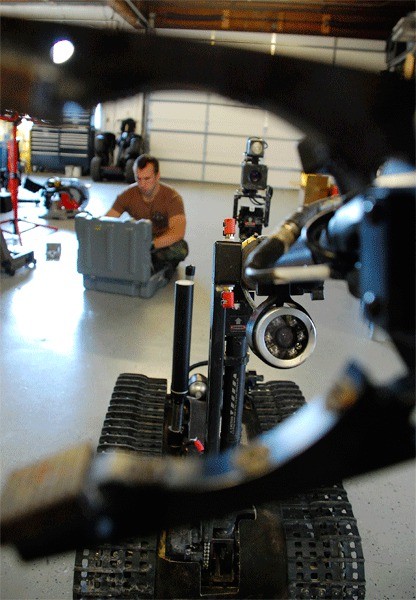Nuclear weapons, pipe bombs, even the occasional long-forgotten box of dynamite; there is no job too big or too small for the bomb boys at Whidbey Island Naval Air Station.
They’ve got the training, the equipment, and the guts to do it all, a fact Explosive Ordnance Disposal Detachment Northwest personnel prove again and again.
“In the last year we’ve probably responded to about 40 calls,” said Lt. Mike Hodges, the unit’s officer in charge.
The primary mission of Detachment Northwest, or DET-NW, is to handle Navy emergencies in the Northwest region, an area covering four states. But like the air station’s Search and Rescue unit, the explosive experts often find themselves assisting local law enforcement.
Since October, bomb personnel safely disposed of a box of dynamite discovered in South Whidbey, investigated a suspicious package in Coupeville and collected and disposed of an unknown explosive device at Langley High School.
They made headlines throughout Western Washington in 2009 when they resolved a bomb scare in front of Whidbey Island Bank in Coupeville.
The need for anonymity tends to make DET-NW members unsung heroes, but they are not forgotten. Island County Sheriff Mark Brown called the unit an “extremely valuable” asset, and one he is lucky to have. The Washington State Patrol has regional bomb squads but few police departments have such a skilled and well equipped resource like DET-NW in their backyard.
“Boy it’s a tremendous resource,” Sheriff Brown said. “It’s very comforting to know they’re here and can help us.”
But while DET-NW obviously stays busy here at home, it’s a shore-leave unit that provides members with some much needed rest and relaxation. It’s made up of Navy personnel that have already spent extensive time serving overseas or on special missions with detachments that do deploy.
For example, they’ve all served with commands such as Explosive Ordnance Disposal Mobile Unit 11, which called the airbase home until just this past year, when it was relocated to San Diego.
The wars in Iraq and Afghanistan have been unlike any EOD units have faced before largely because of the wide use of improvised explosive devices. Small, hidden, deadly; they are the enemy’s weapon of choice and account for more than half of the total casualties since the two wars began.
According to statistics from U.S. Central Command in Tampa, Fla., of the 3,490 American troops killed in action since the start of Operation Iraqi Freedom, 2,197 were killed by IEDs.
In an email to the Whidbey News-Times, agency officials wrote that while such devices are still the foremost risk to troops, “the effectiveness of the attacks is decreasing.” Also, while the number of incidents is on the rise, they are being offset by improvements in the training and equipment used to counter them.
Using statistics from the Joint IED Defeat Organization, the Washington Post reported this month that casualties had been on the decline since 2005, but spiked by 60 percent in 2010. In all, 268 U.S. troops were killed last year and more than 3,360 were injured, an increase of 178 percent, the story reported.
The wide use of IEDs has made this a new kind of war, and one that has put Whidbey EOD sailors on the front lines. And not without casualties, Hodges said.
“Every one of us knows someone who has died,” he said. “It’s a small community so the loss of one is felt by all.”
To date, 13 sailors in EOD commands have been killed. Of the six who were EODMU-11 sailors stationed on Whidbey Island, five were killed as the direct result of roadside bombs, according to Chief Mass Communications Specialist Barbara Albritton, of Commander Navy Expeditionary Combat Command.
“They were all in-country and they were all in the line of duty,” she said.
They include: Petty Officer 1st Class Kevin Bewley, Chief Petty Officer Gregory Billiter, Petty Officer 1st Class Jeffrey Chaney, Petty Officer 2nd Class Curtis Hall, Petty Officer 1st Class Joseph McSween and Chief Petty Officer Patrick Wade.
Explosives ordnance disposal is a dangerous job and everyone knows the risks, Hodges said. Pretty much everyone has been in a situation where they look over and tell their buddy, “Tell my wife I love her.” But they also know that what they do saves lives.
That also is a fact not forgotten.
In a written statement to the newspaper, Capt. Gregory Jay Johnston, the base’s commanding officer, called Hodges and his elite team a valuable asset that helps make the air station what it is. While they are just one of 74 tenant commands that help the base meet its goal of having people and aircraft ready for tasking around the globe, they have the dual role of serving both the Navy and the community.
“We are fortunate to have them based at the air station,” Johnston wrote.



